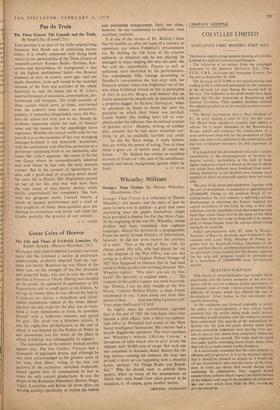Great Cries of Horror
The Life and Times of Frederick Lemaitre. By
Robert Baldick. (Hanish Hamilton, 25s.) His father died when Frederick Lemaitre was nine years old. He followed a variety of picaresque employments, prudently deserted from his regi- ment just before Waterloo (he was fifteen at the time) and, on the strength of his fine physique and pOwerful lungs, was cast to roar the role of the lion in Pyranw et Thisbe. Having now decided on his career, he appeared in pantomime at the Funambules and in small parts at the Odeon. At the age of twenty-three he was offered the lead in L'Auberge des Adrets, a threadbare and cliché- ridden melodrama typical of the times. Decid- ing that the only hope for the play was to trans- form it from melodrama to farce, he provided himself with a ludicrous costume and guyed his part. The result was a hilarious success. It ran for eighty-five performances at the end of which it was banned by the Prefect of Police (a not uncommon fate for many of the plays in which Frederick was subsequently to appear).
The conventions of the century worked terribly against him. The two Theatres Francais had a 'monopoly of legitimate drama, and although he was soon acknowledged as the greatest actor of his time, their doOrs, owing to the fear and jealousy of the societaires, remained implacably closed against him. In consequence he had to make do with current productions. It was the height of the Romantic Movement. Dumas, Hugo, Vigny, Lamartine and Balzac all wrote plays (of varying quality) specifically to exploit his violent and passionate temperament. Only too often, however, he was condemned to indifferent, even wretched, material.
It is one of the virtues of Dr. Baldick's book that he enables us, after the lapse of a century, to appreciate just where Frederick's pre-eminence lay. By lending the full force of his creative authority to whatever role he was playing, he managed to inject tingling life into the stale, the flat and the unprofitable. Players as well as audiences were electrified by his performances.. The redoubtable Mlle George (according to Stendhal's computation she had .slept with her Emperor sixteen times) was frightened out of her wits when Frederick turned on her in paroxysms of fury in Lucrece Borgia, and insisted that on future occasions he should only be furnished with a property dagger. In Richard Darlington, 'when he advanced on Jenny to throw her over the precipice on which their house was perched, Louise Noblet (the leading lady) fell so com- pletely under his influence that she uttered screams of genuine terror.' Dickens, writing of another play, attested that he had never witnessed any- thing 'in art, so exaltedly horrible and awful
. . he did the finest things, I really believe, that are within the power of acting. Two or three times a great cry of horror went all round the house. . . .' Dr. Baldick has written an excellent account of Frederick's life, and of the tumultuous, squalid and heroic background against which he






































 Previous page
Previous page